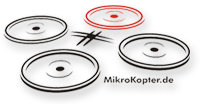Surely for many users the MikroKopter or any quadrocopter is first and foremost a hightech way to have a lot of fun, for flying it can release quite a bit or endorphine and adrenaline. But there are some serious use cases as well. Feel free to contribute to this list.
Use Cases
Aerial photography and video
- A quadrocopter can be used as a cheap and safe tool to create aerial images and video footage for many purposes, e.g.
- airshots of archaeological sites
- images / videos for mapping applications like Google Earth or Maps
actual event footage for online video services like YouTube
- roof or chimney inspection
shoot textures for 3D surfaces (positioning of the camera is already available on the FlightCtrl of the MikroKopter)
- population control of wild animals
- to control the condition of agricultural areas (fields)
The FlightCtrl of the MikroKopter provides the control of a camera tilt servo to provide a stable Image. The MikroKopter is a lot steadier, quieter, cheaper, less energy consuming and less pollution generating than a normal helicopter which is most commonly used today for aerial video and image capturing. It's not as dangerous to fly around people as a model helicopter - the blades are softer and not as fast (talkin from experience).
Flying Measurement Platform
- radiation (no pilot on-board - so we can fly in areas unsafe for humans)
- chemical contamination
- air pollution
- create 3D meshes from data mined with the quadrocopter
Independent Emergency Support
- In case of any natural or technical disaster that makes areas hard to access due to contamination, fire or flooding, the quadrocopter like any video drone can be used as an aerial reconnaissance vehicle to help getting an overview, find victims and to coordinate rescue activity.
- Small payloads of about 500 grams (food, medicine...) can be transfered to people that can't be accessed directly and a manned helicopter would be too dangerous to use.
- The quadrocopter can provide a mobile wireless access point of long range, ideally two of these would be needed to provide continous service (due to battery changes)
- many scenarios that can benefit from aerial imaging, such as forest and other large fires, accidents, for rescue support and damage documentation
Bridge building
- To set up suspension bridges e.g. over flooded rivers or canyons, one needs a thin line first to span the river that can be used to pull over the stronger bridge wires or ropes. The quadrocopter can be used to carry that first line over the river or canyon.
Placing objects somewhere
- some possible scenarios:
- placing of radar reflectors on ice floes for easier detection
- inspection of volcano craters and placing of sensors to predict eruptions
Information campaigns
- When the usual information channels are not available, the quadrocopter can be used to spread important announcements to the population. For instance, "Do not drink water from the river - you will get sick!". Just load the quadrocopter with as many leaflets as it can carry, drop them and gravity and the wind will do the rest.
Problems to solve
- Time of operation:
- Rescue operations, etc. last for hours and a continuos operation for at least 45min should be possible.
( this is probably the most crucial )
- Weather independent operation:
- Most of the operations mentioned above can hardly wait for good weather
- Safety:
if humans are involved, safety and reliability is an issue. ( e.g. 5-8 props, failsafe features, prop-guards, ...)
Links
